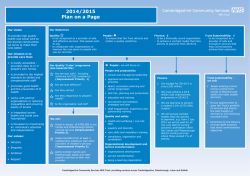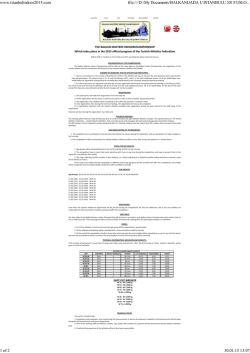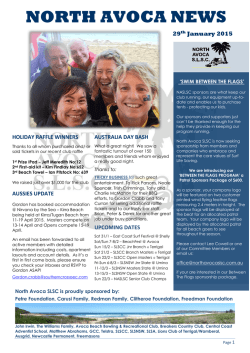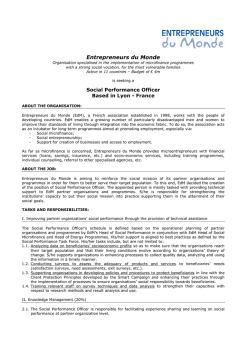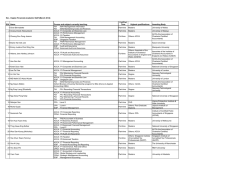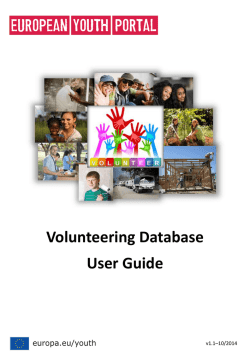
Download Creating a Case for Company Sponsorship
Masters in Finance (MiF) Creating a business case for company sponsorship A. Introduction B. Return on Investment B.1. Key programme features B.2. Programme structure B.3. Recommendation C. Asking for employer support D. Contacts A. Introduction In response to a growing number of Masters in Finance (MiF) students securing sponsorship from their companies, we have put together some general guidelines for potential students who are considering approaching their employer for support. Typically, around 20% of the Masters in Finance class will be sponsored by their employers, with the percentage increasing up to 45% for the part-time Masters in Finance programme. Drawing on the experience of past students who have secured sponsorship from a range of organisations, from blue-chip and central banks, SMEs, and the public sector, we have compiled this guide to help you create a business case to present to your organisation. Feedback from our students suggests that creating a coherent and compelling business case is a pivotal tool when approaching any organisation for sponsorship. Many companies, when approached with such a request may be asking, ‘why should we make this investment?’ and ‘what’s in it for us?’ This guide can help you answer these questions and clearly convey the benefits the unique post-experience Masters in Finance programme for finance professionals from London Business School (LBS) can provide to you and your organisation. We hope the following provides a useful framework upon which to build a solid case. There is no guaranteed success, but thorough preparation and perseverance has paid dividends for our sponsored students. Good Luck! B. Return on investment Make sure you clearly articulate to your Line Manager your expected benefits to the company. Define measurements to assess how your contribution will increase during or after the programme in terms of skills and knowledge acquired, that will benefit both the organisation and you as an individual. It’s important to highlight that the MiF at London Business School is the number one specialist programme for finance professionals worldwide. What makes it unique is the MiF peer group which is comprised of successful individuals with an average of 5-6 years of experience within diverse sectors including financial controlling, treasury operations in corporates, regulatory roles within central banks, investment management, security analysis and broking, capital markets, trading and risk management, venture capital or private equity, hedge funds, corporate finance and corporate restructuring, corporate planning and consultancy, retail and commercial banking, investment banking, or finance in public-sector organisations. On the curriculum side, the MiF’s core courses will help you build in-depth knowledge of key financials tools, concepts and frameworks. For example, the ‘Corporate Finance’ core course will equip you with tools and knowledge on capital structure, market timing, and valuation methods such as multiples, FCF, WACC, APV, and comparables. Whereas, the ‘Personal Assessment and Development’ core course will focus on your interpersonal skills and boost your confidence through developing an awareness of the knowledge, skills, and attributes that underlie your personal growth which is integrated into your organisation’s success. Our MiF alumnus and Executive Director at a global financial services firm in London mentions how receiving company sponsorship to study the part-time MiF helped him get a promotion and directly apply learning at the workplace: “The MiF course has contributed positively to my career development and aspirations. The academic benefits of studying at a top business school are obvious and I've already been able to utilise what I've learned on the course in my current role. The school also has an excellent reputation and is well known within the industry. For example, when I visited our offices in New York last summer it was nice to find that everyone on the structuring desk already knew about LBS and the quality of the MiF program. Getting sponsored provided me with the additional benefit of knowing that the firm has invested in my career development and will be supporting me to realise a return on this investment”. It is also important to highlight the wider benefits for your organisation of establishing links with London Business School. As their ambassador on campus, you can be the bridge linking your organisation to world-class faculty, major global events and the global alumni network. B.1. Key programme features Once you have defined the business need, the next step is to conduct your analysis. Support your choice of programme by identifying the most relevant components to your organisation. Company project The company project is an opportunity to solve an issue that your employer is facing, by conducting thorough research, sharing insights, and getting advice from the specialised MiF peer group and top finance faculty. This will further deepen your practical knowledge and strengthen your industry networks in the area you are currently working in. Previous project topics have included: - Who's shunning the specialist funds? An examination of the real asset allocation policies of investment advisory firms Sustainable Private Equity Investment in Emerging Markets Starting a Hedge Fund: from an industry analysis to a business plan proposal Private Financing of Infrastructure: an assessment of the Peru Experience Concentrations and Practicioner courses The Masters in Finance is a highly practical programme which offers you numerous handson experiences and opportunities to specialise and connect with the world's leading financial cities. Two key programme features which assist you in gaining real business exposure and become an expert on specific areas of finance are the concentrations and the practicioner courses. The concentration study routes offer you the opportunity to develop in-depth knowledge and skills vital for your specific career path running alongside your organisation’s long term goals. With the MiF you can benefit by specialising in key areas such as: - Investment Management and Analysis Corporate Finance Risk Management and Derivatives With our practitioner courses you will also be exposed to industry experts, and real world issues, challenges and experiences that you will encounter as your career progresses. Practicioner courses include: - - - Regulation: theory and practice of regulation, prudential regulation foundation and conducts and market regulation. Public Finance: public sector finance in developed and emerging economies, "hidden" liabilities such as public pension schemes, social security systems, public/private partnerships and explicit and implicit state guarantees. Applied Risk Management & Derivatives: Advanced Financial Modelling, Equity Models, Time Series Analysis, Fixed Income Securities and Credit Risk Modelling. Advanced Financial Modelling: Integrated Financial Model Standards, Valuation Fundamentals, DCF Fundamentals, M&A Analysis, Modelling Fundamentals and LBO Valuations. The Business of Corporate Finance: practical issues such as how to do valuations in practice in different industries and cash flow management. The Business of Asset Management: focuses on the buy-side experience through relationship management, raising and managing money. Top portfolio managers coming to talk about their products. Personal development for finance professionals The personal development for finance professionals (PDFP) is an individually tailored selfdevelopment skills plan that runs alongside the academic programme. The PDFP starts with the personal assessment and development programme, which is one of the core courses. The PDFP provides the opportunity to develop your interpersonal skills which make you excel at work, and offers you a practical insight to the world of finance as well as a fantastic way to make industry connections. You will gain insights into your personality and leadership style; and a 360 survey which provides feedback from others on your strengths and development areas. By mastering communication techniques and improving self-confidence you will increase your personal impact. International exchange program The International exchange programme is a great opportunity to increase your on-theground knowledge and build your networks in a region of your and your company’s interest. We have partnerships with leading institutions, all offering you the opportunity to complete three electives in your preferred location. Please see below the list of our current exchange partners: - China: CEIBS/China Europe International Business School, Fudan School of Management, Guanghua School of Management/Peking University, Tsinghua SEM - Hong Kong: HKUST/ Hong Kong University of Science and Technology Singapore: NUS/ National University of Singapore India: ISB/ Indian School of Business Australia: University of Melbourne Network As a student and graduate of the Masters in Finance at London Business School you will: - Have lifelong access to blue-chip corporate partners and their industry network. Become part of the LBS community made up of 39,000 alumni in over 150 countries. Learn from top finance faculty and from a highly diverse peer group of finance experts coming from more than 50 different countries. Sample analysis Programme Feature Project Finance: elective course Negotiation and Bargaining: elective course Financial Engineering and Risk Management: elective course Investments: core course Return on investment Apply project finance techniques, principles, and valuation methods to large-scale projects within your company. Develop and implement strategies for analysing behaviours and motives of individuals, groups, and organisations in highly competitive deals. Apply advanced continuous-time mathematics and cutting-edge methods to value, hedge, design and structure derivative contracts for your employer. Understand markets from a fund manager’s perspective and improve your investment philosophy to meet your clients’ needs. B.2. Programme structure The Masters in Finance (MiF) is a highly specialist postgraduate degree programme for experienced professionals who want to enhance their careers in finance by gaining technical knowledge and developing their overall business acumen by learning from the best finance faculty and joining the powerful network of a world renowned business School. The MiF can be completed either by studying full-time, in 10 or 16 months, or by studying part-time and remain in employment at the same time, in 22 months on alternate weekends. - Full-time The programme is completed in 10 or 16 months. Students complete four core courses in term one, and the remaining two or three terms comprise of 7 to 10 electives. Practical modules for concentrations are available throughout. The optional fourth term can be used to complete a company sponsored project, international exchange, or additional electives. A typical week consists of around 12 contact hours, plus a minimum of 30 hours of group/individual study. - Part-time The part-time format has been designed specifically for those who wish to remain in fulltime work. Combining work and study allows you to make clear connections between your course and your role, applying your learning immediately. Year one: Introduction week (one week of full-time attendance) – complete the PAD programme and build on knowledge of accounting and statistics in preparation for core courses. Core courses completed on alternate weekends; Friday evenings from 18:00 and Saturdays until 15:30, amounting to a total of 18 weekends in your first academic year. Year two: You will then complete the remaining degree requirements by taking 7 to 10 electives. You can take some elective courses in a block-week format and require attendance from 09.00 - 17.00, Monday to Friday for one week, in modular format (one specific day weekly or bi-weekly), and in evening format from 18.45 - 21.00. Find a sample of the MiF timetable here: Masters in Finance timetable B.3. Recommendation After you have gathered specific evidence that our Masters in Finance programme will benefit you and your company, you will need to ensure that you highlight the aspects of your personal development that are most important in the context of the business need and your career development plans. General: ‘I believe that it is the right time for me to pursue a Masters in Finance programme because I do not wish to restrict myself to financial accounting alone. The programme will increase my opportunities to advance in different areas of the business. I cannot progress to more senior positions without developing my skills in the areas of investments and corporate finance. The MiF will equip me with a broad range of financial acumen, as well as developing on my leadership potential, therefor enabling me to continue to progress successfully within our organisation.’ Specific: ‘As a Trader in X department, I am tasked with delivering on…’ ‘To date, within our organisation I have achieved…’ ‘In order to progress within the organisation, it is vital I develop X skills….’ If your organisation offers internal development programmes or even external training with other institutions you may need to clarify why a Masters in Finance at London Business School would be preferable to a number of short development programmes. In this case, you should place an emphasis on the ability to learn from world leading finance faculty who, alongside teaching, consult and sit on the boards of major multinationals and conduct ground breaking research in their fields of expertise. The rigour of the programme sets it apart from shorter courses, as well as the opportunity to learn from and collaborate with your diverse and experienced peer group. Once you have graduated, remember that you and your company have access to a powerful and influential professional network for life. C. Asking for employer support I. Financial support Think carefully about the level of financial contribution you require, making sure you have up to date information on tuition fees. You may also need to request additional funds for accommodation, travel and materials. Think about different funding models so you have a “package” to request, and can offer different positioning. Outside of 100 per cent funding, students on recent intakes have been financially supported in a variety of ways, including matching funding, percentage splits, reduced hours, salary sacrifice, tuition reimbursement at key stages or after successful completion of parts one and two, and bonus payments. The agreement you finally come to will most likely be the result of a back and forth negotiation between you and your employer. The monetary contribution you receive is most commonly dependant on how long you are going to be contractually obliged to remain with the organisation. If you require a significant level of funding, be prepared to be very flexible with this detail. II. Time If you want to pursue the part-time MiF, you will need to show how you will manage any time out of the office, and what you will do to minimise the impact on your team or clients. Allow time off to complete studies, but also be aware that deadlines may conflict with business needs. Indicate clearly in your request the extent of the time required, and whether you will be using any personal time (agreed study days, unpaid leave, vacation, lieu time) for this. It may be helpful to put the detailed schedules into an appendix, and to give a short table within the business case showing the requirements for the Masters in Finance and, if appropriate, comparison with any other programmes. Please highlight the fact that you can graduate from the full-time MiF in 10 months or study the part-time MiF and remain at work. Since you may be able to return to your organisation sooner or study and work at the same time to apply what you learn, this is a very important negotiating tool. Your absence from work is likely to be considered as much of an investment for your employer as any financial contribution they make. III. Commitment and Conclusion Your statement of commitment is critical and should show your commitment to the organisation, and to being a successful student on the programme. There are a variety of ways of demonstrating this commitment, and as previously explained, agreements will most typically encompass lock-in periods, reimbursement of tuition and other costs. The statement of commitment ensures that you take responsibility for your learning and repay the investment that has been made for you by your company. D. Contacts We hope this guide is helpful and wish you the very best of luck! If you require any further information about the Masters in Finance (MiF) or London Business School to support your business case, please contact the Recruitment team: Tel: +44 (0)20 7000 7500 Email: [email protected] Should your employer wish to have a direct point of contact at the School to answer any questions or concerns they have, or to build a relationship with London Business School, we would be delighted to hear from you. Please contact: Eugenia Karapiperi Business Development Manager, Degree Programmes Email: [email protected], Tel: +44 (0) 20 7000 7548
© Copyright 2026

